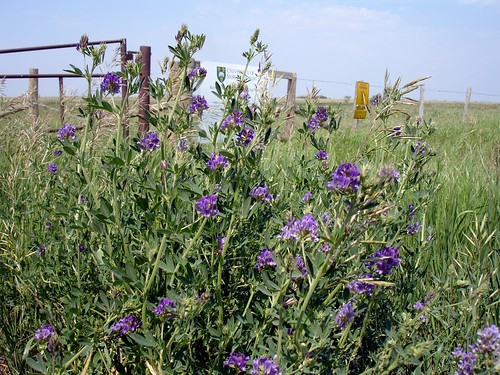Alfalfa plant, which is botanically known as medicago sativa, is a perennial legume plant rich in nutrients and crucial for livestock feed. It contains and provides high-protein hay, silage, and pasture for dairy and meat production.
The crop is also significant for soil improvement, erosion control and water management, as it has nitrogen fixation, reducing fertilizer needs, deep roots to stabilize soil, drought tolerance and water usage efficiency.
By and large, it has nutritional value and it is rich in vitamins, minerals, and protein, and it supports eco-friendly farming practices.
Hence, in an effort to boost livestock production in the country, this rich but scarce/rare crop which provides an animal ‘balanced diet’ was recently launched in Plateau State.
Its richness makes it a popular choice for animal nutrition and it is mostly found in Kenya and Mexico. But it also has the tendency to grow and perform well in Plateau State because the state has the needed climatic conditions that can make the crop thrive.
The versatility and benefits of this crop makes it a valuable crop for farmers, livestock producers, and the environment, not only in Plateau State but the country at large.
Though the crop/plant is not much known to farmers across the state and country yet because it is not quite grown and common, nonetheless some farmers in the state bore their minds on it after its launch this week.
They said they will be closely monitoring the crop/plant carefully to see its performance, benefits and value in order to get engaged in its cultivation.
One of such farmers is Alex Amos, who farms around the Lamingo Dam area in Jos, the Plateau State capital.
Amos, who mostly cultivates potato (popularly called Irish potato), said he has never heard of the crop until its recent launch, but that from the explanation, the crop cultivation would be worth venturing into.
According to him, the issue with cultivating some crops is not in its quality, nutrients or popularity, but its acceptability and patronage by the users who will patronize the farmers and uptake it from their hands after cultivation.
He however promised to give the crop a trial whenever the cultivated one and the seeds are made available to the farmers to purchase and cultivate.
On her part, a wheat farmer in Dwei-Du in Jos South, Ene Ameh, said she had never been very interested in cultivating any plant meant for animal feed.
She, however, said that from what she has heard about the alfalfa plant, she might consider giving it a trial once the seeds become accessible.
Meanwhile, the alfalfa crop cultivation initiative is a public-private partnership that includes the Alternative Bank, the Federal Ministry of Livestock Development, and Plateau State University (PLASU), Bokkos, where the project was launched.
Speaking at the event, the Group Head of Structured Trade and Commodities Finance of the Alternative Bank, Gbenga Awe, said the initiative is not only aimed at boosting feed and livestock production, but will support the farmers and the pastoralists alike.
‘Our bank’s non-interest finance model was well suited to address Nigeria’s agricultural challenges. Our model enables us to directly invest in projects that combine economic and social impact.
‘This partnership with the Plateau State University is not just about cultivating alfalfa, it’s about building a sustainable ecosystem.
‘We have confidence in the university to deliver, as they have projected a 10-ton per hectare yield for alfalfa, and that’s exactly the kind of ambition we are excited to support,’ he said.
In his remarks, the Vice Chancellor of the University, Shedrach Gaya Best, highlighted that the vicinity had long-standing livestock history dating back to the colonial era, and there was no better place in Nigeria for livestock development than Bokkos.
‘We have had a dairy farm and agricultural training facilities for decades, and we are proud to continue that legacy. The university had already overcome early challenges in the alfalfa trial and had developed new water infrastructure to ensure success going forward.
On his part, Richard Mark Mbaram, Special Adviser on Knowledge Management and Communication to the Federal Ministry of Livestock Development, described the project as a model for national transformation.
Mbaram reiterated that alfalfa is a critical crop that can help reduce pastoral migration, address feed shortages, and minimize farmer-herder conflicts.
‘This isn’t just about growing grass. It’s about securing our food systems, reducing conflict, and giving pastoralists and farmers new tools for climate resilience,’ he said.
On why the alfalfa cultivation initiative was launched in Plateau State, the dean of Faculty of Agriculture PLASU, Dr Hosea Finangwai, who described alfalfa as a temperate plant, said because Plateau State is a near temperate weather environment, that is the reason for doing an adaptability trial of the plant in the state, to see if the temperature would be suitable for the production of the crop.
Finangwai, who was also the immediate past Plateau State Commissioner for Agriculture and Rural Development, explained that the crop was brought from Kenya because the temperature of Kenya and Plateau State is similar, and that the earlier adaptability trial shows that the crop can do well in the state.
He said they would upscale by producing it to see the different stages of growth, the yield in terms of seed which is expensive, and thereafter expand the scope.
The dean added that alfalfa cultivation had been tried in some parts of the state before but it did not perform well because the climatic condition was unfavourable to it.
Provided by SyndiGate Media Inc. (
Syndigate.info
).







